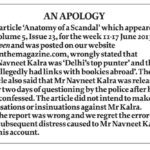MP will also forge ahead like Gujarat, says CM
Interview with Madhya Pradesh Chief Minister Shivraj Singh Chouhan
/wp-content/uploads/2015/11/Shivraj-singh-Chauhan-by-Raul-Irani-1.gif)
Interview with Madhya Pradesh Chief Minister Shivraj Singh Chouhan
Madhya Pradesh chief minister Shivraj Singh Chouhan is gung-ho about the prospects of investments in his state following the much-hyped fourth Global Investors Summit held in the state which is modeled on the Vibrant Gujarat Summit. He spoke to Ullekh NP about the challenges and opportunities for ensuring ease of business in the land-surplus state. Excerpts from the interview
Your government has earned a lot of praise for lifting several regulations that hurt the ease of doing business. What are the mechanisms in place to check that your trust is not, in turn, misused by corporates? How do you ensure that balancing act? Specifically, how do you ensure that land sale to business don’t end up being land grabs?
Our gradual rise has ensured a steady learning curve, imbibing best practices and filtering out flaws witnessed in investment promotion policies. Our much talked about Single Window Investment Facilitation System under MP TRIFAC (Trade & Investment Facilitation Centre) has regulatory compliance integral to it and not divergent or distinct from it. That is the essence of single window systems, So while adequate facilitation is ensured, all the governance and regulatory aspects are completely accounted for on paper and in procedure.
The 25,000 ha of land bank hasn't been acquired from farmers. It is surplus land under the custody of my Govt., which is ready to be allocated to approved investments after having ensured due (legal) process. It is our stated policy that arable land shall not be acquired for non-agricultural purposes. Land has first been planned and prepared for early bird investments. If at all, under extraordinary circumstances – for instance, due to contiguity of a patch of privately owned arable land needs to be acquired, it will be ensured that the owner gets complete compensation for the land, while a part of it is reserved as the owner's share, or alternately, the owner's family gets gainful livelihood for at least 6-7 years from the project for which the land has been acquired. This is in addition to the compensation. I have ensured that my Government abides by the principle, "Sabka Saath, Sabka Vikas".
What do you plan to do about the Prime Minister's suggestion that MP should now focus on developing "value-add" in agriculture? How do you plan to go beyond mere food security in agriculture production?
MP has achieved an unprecedented sectoral growth rate of 25% in 2013-14, highest globally. It is critical that this is sustained using steady value addition in terms of crop & activity (agriculture, horticulture, pisciculture, dairy, poultry, etc.) diversification, while targeting scales to enable steadily rising exports while taking off sufficient amounts for the domestic market and subsidised distribution. Agri technology and Food Processing is our most critical priority sector soliciting investments.
MP has been the largest producer of soya bean and pulses in the country. It was awarded the Krishi Karman award for highest growth in food grains in India, three years in a row. It is also one of the leading exporters of basmati rice to the USA and Canada. We have received 726 investment proposals worth Rs 36,462 crore which is very encouraging for us. We hope to steadily open diverse market avenues to farmers.
This shall be complemented by fast paced logistical infrastructure development (transport, warehousing and cold storage). Development of this sector is central to MP's prospects. The big ticket projects like the North-South–East-West Corridor (NS-EW) highway project and connectivity between our integrated inland container hubs and the prime seaports promise to boost our agricultural returns on investment, by ensuring timely transfer to ports for export.
But let's accept that MP is one of the principal food grain and pulse producing states and bears the noble responsibility of providing sufficient food grain and other food crops to fuel the food security policy. We shall ensure synergy with the reform of the Food Corporation of India through our PDS reform and modernisation drive, thus ensuring that Food Security policy, while being just, is smart and efficient!
Now that you have got rid of power shortage, how soon do you expect to sell power?
We are power surplus with a generating capacity of 14000 MW, with 24×7 power supply to our Industries. While you’d naturally ask this question, we have ensured that while we steadily developed our State’s power production scales, we have simultaneously worked towards improving our distribution and supply (including tariff and metering aspects). We hope to successfully put in place our feeder separation and differential tariff regime by the middle of next year so that they do not lag investment absorption while simultaneously universalizing access – right up to last mile users, be they agricultural or residential. Another critical component of this agenda is distribution of surplus to the grid or to power deficient States through PPAs (Power Purchase Agreements).
What is the rate of success of MoUs signed thanks to previous GIS summits?
During the summit of 2012, MoUs worth over Rs 2 lakh crore were signed. I’m happy to inform you that the total implemented investment since 2012-GIS 2014 is over Rs 1.8 lakh crore ($30 billion). This has been achieved despite the many adverse circumstances facing India in general, and the State like mine, being landlocked, and ruled by a party that was in Opposition at the Union, in particular. We had been suffering several adverse impacts of the global recessionary relapse, where import markets had turned bearish. The investment scenario in India was suffering due to former Union Government’s policy paralysis. Critical decisions on investment clearance and facilitation were just not being taken.
Many have asked me about adverse feedback received from industry regarding the slow pace of progress in investment absorption. Let me clarify again that this resulted by and large from whatever was under the Union jurisdiction. We at the State level, while streamlining our regulatory and facilitation processes (like TRIFAC), consistently tried communicating with the Centre on the need to expedite approvals, MP being a crucial State, both in terms of production as well as logistics. A situation had been perpetuated where national investors were pulling out their investments to divert them to performing markets. The Principle of Individual and Collective Ministerial Responsibility were grossly violated.
It is commendable that we achieved such a respectable rate of investment absorption despite these handicaps. Now, with the Union Government led by PM Narendra Modi, we have already witnessed fast paced rationalizing of regulatory processes. There is a renewed zeal and vigour to consistently coordinate and communicate with the State authorities so that complete streamlining is achieved in this regard. Under cooperative federalism, we are consistently ensuring policy compatibility (between Union and State) through reform, so that the benefits of investments, principally job creation and income generation, can be quickly realized.
Which are the top five segments that will see major investments in the state as regards manufacturing is concerned, say, over the next years?
Five sectors that we are observing with great anticipation in terms of enhancing Madhya Pradesh’s manufacturing output are: Automobiles, food processing and packaging / fast moving consumer goods (FMCG), defence production, electronics/ IT & IT enabled services and renewable energy technology.
Your front office is quite impressive thanks to high growth figures. But there are issues in the backyard. Madhya Pradesh's social indicators are still not very high. How soon do you expect growth to have a push up effect?
We are not merely relying on industrialization to push human development indices up. My government considers this to be the most important mission. Apart from steadily increasing and implementing public investment in institutional education, healthcare, sanitation as well as women’s empowerment through training for self-reliance, we are soliciting the active participation of private players at various tiers. We’re trying to consistently ensure that best practices are institutionalized throughout Madhya Pradesh to tackle problems of maternal and infant mortality and girl child dropouts. So that a holistic approach towards enhancing human development figures of my state is guaranteed.
MP had been a BIMARU State for too long and the task is uphill. So while we have succeeded at steadily raising out average income and lifting many out of poverty, our policies are being recognized by the Union Govt. as having the potential to resolve these issues, and I’m confident that Narendra Modi’s Government shall support us fully in this mission. Just as he has led mass mobilization efforts through the Swacchh Bharat Abhiyan, my Government shall embark on a mass mobilization drive to bring IMR & MMR figures at par with the national average, so that in the Global Investors Summit of 2016, we can proudly showcase our achievement as a State.
What are the plans on the anvil to boost connectivity and public transport in rural areas?
The key to the success of rural infrastructure lies in ensuring synergies of capacity building under programmes like Mukhyamantri Gram Sadak Yojana with the key arterial projects that are part of the DMIC, NS – EW corridor, state highway development, etc. Besides, the connectivity that would be developed between industrial clusters and investment zones would greatly benefit the intermediate rural belts. Rural areas flanking the big projects, once connected, will lead to expeditious extension to contiguous areas, since it will be rendered viable due to buoyant economic activity and usage. Madhya Pradesh is a key State in ensuring the success of logistical infrastructure for rural produce and industry. We are increasingly focused on boosting rural productivity in agricultural and allied sectors.
How do you feel about lifting the state out of the BIMARU status?
Yes we have successfully brought our state, which was a part of the backward, underdeveloped BIMARU States, to this juncture of optimism and potential. But this is an interim achievement, not the destination. Yet, we have a long way to go, lots to achieve in terms of improving human development and health indices.
I am optimistic. Madhya Pradesh will be a key driver of India’s transition towards being a developed nation. We shall strive, through diverse investments, to steadily enhance the purchasing power of every household, empowered by stable and remunerative livelihood. This is one of our major objectives for pitching so strongly for MSME sector investments, since they are the ones that would ensure the most optimal employment absorption.
How do you plan to complement the Centre in the “Make in India” drive?
The ‘Make in Madhya Pradesh’ agenda is integral to PM Modi’s ‘Make in India’ vision. Through a revived spirit of cooperative federalism, we have already begun ensuring complementarities. Modi is a visionary, whose vision in this regard is based on a long experience as a very successful Chief Minister. The ‘Make in India’ campaign lays great emphasis on the fact that success earned by States adds up to build the success of India as a whole.
On the one hand, all the sector specific policies that we have laid out will add up to form just the right policy ecology that the Make in India campaign requires to succeed and sustain. Be it regarding land provisioning, financial and non-financial aspects of sector-wise policies, power and water supply management, labour reforms, etc. Madhya Pradesh, I reiterate has a very crucial role to play in the campaign, due to the very potential it bears in ensuring adequacy of logistical infrastructure, power and water, other raw materials, land banks, and its central location functioning as a naturally viable inland logistics and transhipment hub. It is not an exaggeration to say that the success of “Make in India” will be “made in Madhya Pradesh”.
How inspiring for you is the story of Narendra Modi's rise in politics?
Narendra Modi and his team embody the hope and expectation of the Indian citizen keen on attaining deliverance from corruption and mediocrity, to realize his / her potential to achieve. This is probably the best phase for India, where a person who has worked tirelessly for the country and witnessed ups and downs at every stage, is at the helm of affairs, supported by a very able team. His success has re-instilled in us, the confidence that we will be able to achieve all that we have pledged, for India in general and our respective states in particular, as a team. The Global Investors Summit 2014 is the first summit he graced with his presence as Prime Minister. His presence itself generated an energy that was evident in every individual working to make the summit a success. The way in which, under his leadership, the BJP-led NDA has transformed the visceral and adverse dynamics between Governments into a State of synergy and cooperation, gives us the hope that India will once again witness an era where the Constitution of India governs every intervention of Government. Good Governance is not a jargon. It is exactly what is being articulated and implemented.
There is criticism that GIS was high on hype and low on substance?
The mandate my party won to run the government from 2013 to 2018 makes me answerable primarily to the people of Madhya Pradesh. Every feedback coming from them, positive or negative, is equally significant. It is my responsibility to submit a report on what my Government has achieved, or not, through this Global Investors Summit. My government’s governance track record is testimony to the fact that we are working with the sole objective of attaining prosperity for the people of Madhya Pradesh. Giving a boost to employment generation, that too in diverse sectors, and large scale, demands a magnum opus such as this one. The GIS has been a medium through which my government has invested in the future for the people of Madhya Pradesh, the prime stakeholders.

/wp-content/uploads/2025/07/Cover-Shubman-Gill-1.jpg)













More Columns
‘Fuel to Air India plane was cut off before crash’ Open
Shubhanshu Shukla Return Date Set For July 14 Open
Rhythm Streets Aditya Mani Jha